Research Article
POST COVID-19 TOURISM RESUMES WITH ‘TRAVEL BUBBLE’: A STUDY ON THE PREPARATION OF THE HOTELS AND RESTAURANTS IN NUWARA ELIYA, SRI LANKA
1007
Views & Citations7
Likes & Shares
ABSTRACT
Sri Lanka was a sustainable agricultural country in the past which is currently paid international attention as a unique tourism destination in South Asia. The tropical climate, agricultural background, and its reputation as a tourism destination accommodate the concept of Agro-tourism to practice in several destinations in Sri Lanka. Hereby, this study is focused on Nuwara Eliya as a high potential tourism paradise to experience agro-tourism as a part of sustainable tourism. The findings of this study that are based on secondary data and information extracted through archival research reveal problems, opportunities, and potentials of current practices of agro-tourism in Nuwara Eliya. Hereby, 15 agro-ecological regions introduced by the Department of Agriculture, Sri Lanka in the secretariat division of Nuwara Eliya were subjected to examine the agro-sustainable features based on five principles of sustainable agriculture recognized by FAO. Consequently, this assessment revealed the problems which are related to policy implementation, the inefficacy of resources management, coordination failures, environmental pollution, lack of knowledge and awareness about the current practice of agro-tourism within the subjected regions. This study recommends the initiation of monitoring, certification, and awareness programs to assess the sustainability of agro-tourism practices while performing institutional coordination flowing process to enforce the interactions between tourism and agriculture to coordinate agro-tourism affairs in Nuwara Eliya. Finally, employment and commercial opportunities, cultural and social potentials, technological and methodological capabilities have been introduced in this study that can be important to provide a sustainable approach towards agro-tourism practices in the future.
Keywords: Travel Bubble, COVID-19, Hotels, Restaurants, Travel, and Tourism, Nuwara Eliya
ABBREVIATIONS
SLTDA: Sri Lanka Tourism Development Authority; PPE: Personal Protection Equipment.
INTRODUCTION
The industry of travel and tourism had become the third major foreign exchange earner by 2019 (SLTDA, 2019) in the Sri Lankan economy. Unfortunately, the outbreak of COVID-19 that was declared as a global pandemic by the World Health Organization (WHO) on 12 March 2020 has marked a tragedy in world history by 2021 collapsing economic, political, and socio-cultural ties and affairs all over the world. Consequently, the health authorities have taken decisions over the control of the COVID-19 pandemic by shutting down national and international borders to restrict the movements of the people.
On this background, the industry of travel and tourism is directly hit by the pandemic reporting a great economic recession, especially in the countries that are highly dependent on travel and tourism. According to the outlook of the United Nations, World Tourism Organization (UNWTO) for 2021 reported that international tourist arrivals have been decreased by 87% in the first quarter of 2021 exceeding the same period of 2019. This would be a loss of 260 million international tourist arrivals compared to the pre-pandemic period. In this case, Asia and the Pacific region have recorded a 96% loss of international tourists' arrivals due to the highest travel restrictions imposed in January 2021. As well, Europe and Africa have noted an 85% downturn of tourist arrivals while the Middle East and American regions are reporting respectively 84% and 77% of drop-down in international tourist arrivals by January 2021 (UNWTO, March 2021). According to these facts, the highly affected areas by the current outbreak of COVID-19 are the Asia and Pacific region is relevant to the industry of travel and tourism. The reason for this pathetic situation could be that the most attractive tourist destinations have been located in this particular area. Therefore, the concept of “Travel Bubble” might be most applicable in South Asia.
The concept of “Travel Bubble” will allow quarantine-free travel between countries re-opening cafes, pubs, bars, hotels, and other businesses powered by tourism. Therefore, Singapore, New Zealand, Brunei, and Hong-Kong (China) eased their restrictions and started post-COVID-19 tourism resumes under "Travel Bubble" (UNWTO,2020). Adhering to the world order, Sri Lanka started post-COVID-19 tourism resumes with few Ukraine tourist groups starting from 28 December 2020 and detected some of them are positive with COVID-19 by the screening test done at the airport on arrival (Anthony, 2020). However, several tourist clusters made their trips towards the cultural triangle (Sigiriya and Polonnaruwa) and Yala National Park under the “Travel Bubble” while positive tourists were being under quarantine (Velrajh, 2021). As complained by SLTDA, these groups have continued with Whale Watching at Mirissa using private boats, and 28 jeep safaris without any prior notice or approval from SLTDA (Hamza&Kotelawala, 2021). Consequently, the concept of the travel bubble was subjected to controversial debates in Sri Lanka due to the shortcomings that occurred during the pilot project.
In this context, this study examined the potentials and applicability of Nuwara Eliya to practice the concept of "Travel Bubble" since Nuwara Eliya is one of the most significant and ideal destinations in the island. The natural and cultural background in Nuwara Eliya provides a unique experience for the tourists that they will never feel in the other destinations in Sri Lanka.
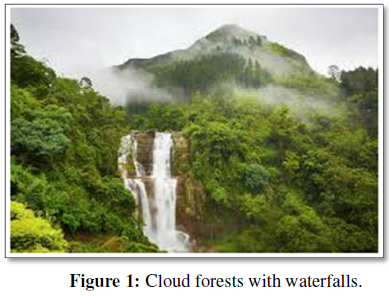
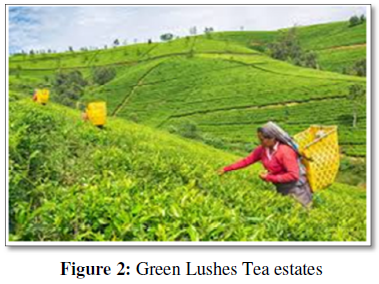
According to (Figure 1, 2) the cool climate surrounded by the huge mountain ranges covered with green lushes tea estates and clouded forests nourished by the waterfalls is eye-catching sceneries attracted by the tourists in Nuwara Eliya. The distinctive cultural diversification in Nuwara Eliya has accommodated Ecotourism, Agro-tourism, and Tea tourism with various tourism activities to relax the minds of the tourists. Consequently, Nuwara Eliya has yelled for 31.7% tourist attraction out of 57.4% of visitor occupancy rate in the hill country by the 1st quarter of 2019 before the COVID-19 pandemic (SLTDA, 2019). Therefore, this study is focused on Nuwara Eliya as one of the most popular tourist destinations in Sri Lanka which is worth introducing the concept of "Travel Bubble" in post-COVID-19 tourism resumes.
The concept of the “Travel Bubble” will be important for everyone who actively participates in the industry of tourism as stakeholders. On this background, the scope of this study will focus the accommodation sector in Nuwara Eliya special reference to hotels and restaurants in the area. The concept of “Travel Bubble” is naval for the accommodation providers in Nuwara Eliya and the pilot project of “Travel Bubble” initiated by the Government is yet to be introduced in this destination in the future. However, the major purpose of this study is to investigate and introduce the background, preparation, and problems of the accommodation sector before post-COVID-19 tourism resumes by using the concept of "Travel Bubble". Hereby, this study is supposed to investigate the applicability and potentials of initiating the concept with accommodation providers in Nuwara Eliya. Finally, this study will find solutions and make suggestions to promote the concept to render excellent service for the visitors who are traveling with travel bubble in the future, Nuwara Eliya.
Hereby, this study will focus on a few research questions to answer through the findings of this study. These investigations will reveal the background, knowledge, awareness, and preparedness of hotels and restaurants in practicing the proposed concept based on the following major research questions.
RQ1: How is the preparedness of hotels and restaurants towards the post-COVID-19 Tourism operations to be up-lifted under the concept of "Travel Bubble" in Nuwara Eliya?
RQ2: What are the barriers and difficulties faced by the hotels and restaurants implementing health protocols during the “Travel Bubble” operations in Nuwara Eliya?
These research questions will be answered in the forthcoming sections and those findings will conduct this study towards a successful research outcome which makes reciprocal benefits for all parties who join with the practices of travel bubble in the future, Nuwara Eliya.
MATERIALS AND METHODS
This study was based on primary and secondary data and information. The preliminary data and information of this study were collected through a questionnaire based on Chapter 4: ‘Accommodations’, “Sri Lanka Tourism Operational Guidelines with Health Protocols” recommended by (SLTDA, 2020). This questionnaire was included 31 questions focused on the guidelines and protocols regarding Guest room corridors and lift lobbies, Restaurant, Kitchen conditions, Buffet setup and services, Gym and treatment facilities, Bars, Swimming pool, Banquet operations, etc. and the concept of “Travel Bubble”. Further, the primary data and information were gathered through the discussions, interviews conducted with the management, and the other staff members of selected hotels and restaurants along with field visits. The secondary data were gathered through archival research to understand the conceptual background of the study. In the process of data collection, several field visits were made towards sample hotels and restaurants following prescribed health protocols and guidelines. This survey was taken place at the beginning of January 2021 in the background of the pilot projects regarding the "Travel Bubble" are lifting in selected areas in Sri Lanka by the government. 11 hotels and 07 restaurants participated in this survey. 06 hotels and 02 restaurants completed the survey while 03 hotels and 03 restaurants answering partially. 04 participants abandoned the survey.
RESULTS AND DISCUSSION
This section will reveal the most significant output of this research. As the first step, the results of this study will determine the contemporary background of the current practices of tourism in Nuwara Eliya. Hereby, this study evaluated the financial, administrative, and managerial matters related to the hotels and restaurants before COVID-19 and after the COVID-19 pandemic.
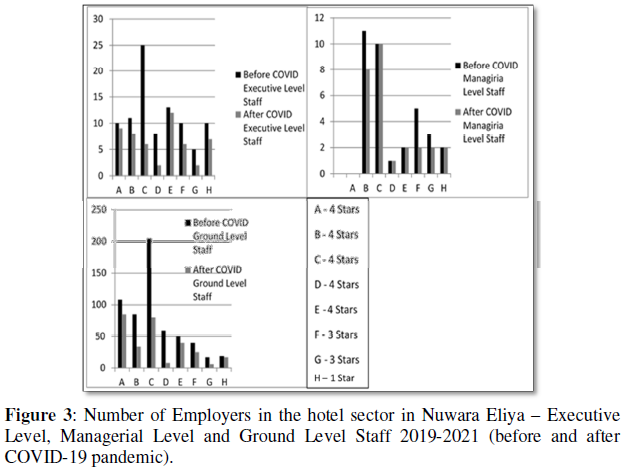
(Figure 3) reveals the gaps in employment occupancy before and after the COVID-19 pandemic in the accommodation sector in Nuwara Eliya. This statistical analysis of the data emphasized that the majority of 3 stars and 4-star hotels have recorded 40%-60% of unemployment rate while the restaurants and small-scale hotels below 3 star showing less than 20% of the unemployment rate. 5 stars, 4 stars, and 3 stars that are favorably based on foreign tourism markets maintaining a comparatively higher number of staff members. With the suspension of these foreign markets due to the pandemic, the surplus of the staff was resigned or returned to their hometowns by the authorized management of the hotels due to the wage payment crises. Therefore, the unemployment rate associated with the hotels above 3-star categories has been increased at the present. The hotels below the 3-star category and restaurants are still recorded less than 20% of the unemployment rate since they are maintained under a few staff members compared to 3 stars, 4 stars, and 5-star hotels.
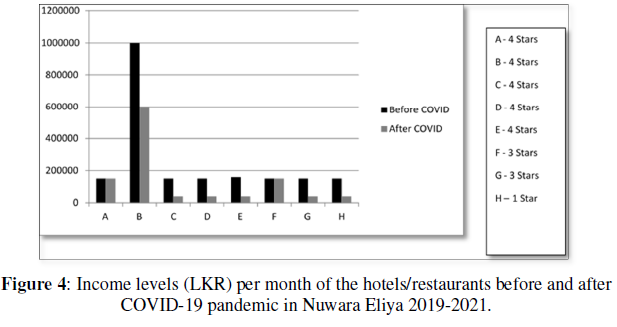

According to (Figure 4) comparing the income levels of the accommodation sector during the two time periods of before and after COVID-19, reveals that 75% of hotels that are categorized under 3 stars and 4 stars have lost 50% or more of their regular revenues after the pandemic. On this background, 66.6% of hotels that were registered under SLTDA have been granted financial benefits which are grace periods for their bank loans while 50% of hotels in Nuwara Eliya were gaining from tax payment reduction offered by the government. Unfortunately, 50% of micro-level hotels and restaurants that fall under the 1-star category were not granted any benefit from the government. In this situation, 25% of SLTDA registered hotels and restaurants were temporarily closed (Ariyawardana, 2021).
This study investigated the preparation of hotels and restaurants to follow ‘Sri Lanka Tourism Operational Guidelines with Health Protocols’ introduced by SLTDA. Hereby 100% of hotels and restaurants were aware of the operational guidelines and health protocols. Unfortunately, the majority of hotels and restaurants do not follow the tourism operational guidelines and health protocols as recommended by SLTDA though they have aware of the procedures (Table 1).
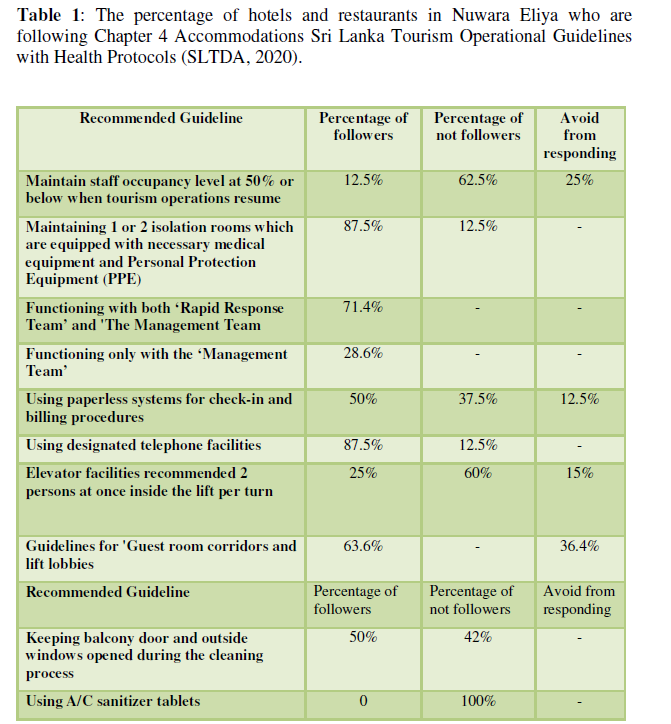
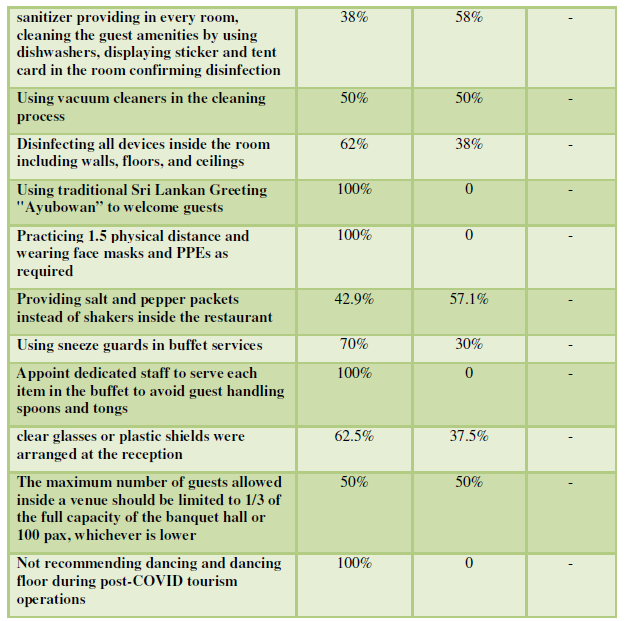


According to (Table 1). recommended staff occupancy rates, banquets operations, buffet setup and services, cleaning processes, elevator operations, and other conditions were not properly practiced in Nuwara Eliya as expected and recommended. The major reason for this situation is the financial difficulties faced by the hoteliers in the post-COVID-19. Therefore, 57.1% claimed financial support to practice those recommended guidelines and protocols under the travel bubble concept while 28.5% completely agree with the recommendations produced by SLTDA.
As the final step, this study examined the preparedness of the accommodation sector to practice the concept of "Travel Bubble" in future tourism operations. This survey revealed that only 44.6% of hotels registered under SLTDA have been aware of the concept and 50% of hoteliers had satisfactory knowledge regarding the travel bubble. 75% of hotels and 65% of restaurants both registered and not registered under SLTDA were aware through public media while 12.5% of hotels were aware by SLTDA. However, considering all the sample hotels 42.8% have obtained adequate knowledge of the travel bubble while 48.2% are claiming more knowledge and information regarding the concept.
CONCLUSION
The theoretical background of this study is shaped by the definition and past practices of "Travel Bubble", though this concept is quite naval for Sri Lanka. The word "Bubble" was originally mentioned by (Cohen, 1972). In mass tourism. He applied this term for describing the environment referred to as "Environmental Bubble" which is a familiar, comfortable microenvironment within a novel, foreign macro environment. Further, (Weaver, 2005). Has defined an environmental bubble as "enclosed spaces that shield tourists from potentially unpleasant experiences...[and that is] operated for the exclusive use of tourists" which is consisted of resort complexes, theme parks, tour buses, cruise ships, etc. Subsequently, the term "Travel Bubble" has been derived from the term "Environmental Bubble". According to (Smith, 1977), he explains the tourist's experience which is "being physically 'in' a foreign culture while socially 'outside' the culture" as "Tourist Bubble". (Jacobsen, 2003) describes the tourist bubble in the context of inter-European travel as "a territorial and functional differentiation and an expectation of (European) holidaymakers going abroad". According to (Carrier&Macleod, 2005). The tourist bubble had been applied in an all-inclusive resort in the Dominican Republic where spatial and tourists could visit local villages, but residents were not permitted on the resort property.
The concept of “Travel Bubble” is derived from these historical terms. This study was based on the concept of “Travel Bubble” which is also introduced as “Green Corridors”, “Travel Bridges”, “Corona Corridors” and “Travel Corridors”. “Travel Bubble” can be defined as “agreements ratified by the signatories to open their borders to visitors from a partner economy or economies" (Dickens et al, 2020). that could be used for business or leisure travel which is beneficial and facilitate recovery trade and economy rebuilding transport sector and relationships between families and friends (Khan et al, 2020). The first travel bubble in Asia was lifted between the Republic of China the Republic of Korea on 1 May 2020 (Helble & Fink, 2020). However, the concept of travel bubble allows the tourists to travel for 14-day quarantine free upon testing negative for COVID-19 between the countries that are committed with agreements at the present.
This study examined the potentials and applicability of the concept of "Travel Bubble" operations with the post-COVID tourism resumes in Nuwara Eliya. Hereby, this study examined the preparedness and the obstacles faced by the hospitality sector in the implementation of “Travel Bubble” practices following recommended tourism guidelines and health protocols recommended by SLTDA focusing on hotels and restaurants in the city area. Hereby, the data and information were collected through a preliminary survey by using questionnaires, discussions, interviews, and field observations with the participation of hotels and restaurants in Nuwara Eliya under recommended health protocols imposed by SLTDA. (Figures 5,6). indicate the nature of the participation of hotels and restaurants in the survey. Hereby, 63.63% of hotels have participated in the survey while less participation rate of 28.50% is recorded by the restaurants in Nuwara Eliya. (Figure 5, 6).
Finally, this survey has resulted that the unemployment rate of the hospitality sector in the post-COVID-19 tourism resumes has been recorded a clear-cut decline especially in hotel sector fall under 4 stars and 3 stars categories and considerably the restaurants in Nuwara Eliya. As well the income levels of the majority of hotels and restaurants have been dropped down exceeding 50% ratio after the COVID-19 pandemic compared to before the pandemic. On this background, most financial benefits that are grace period for bank loans, tax
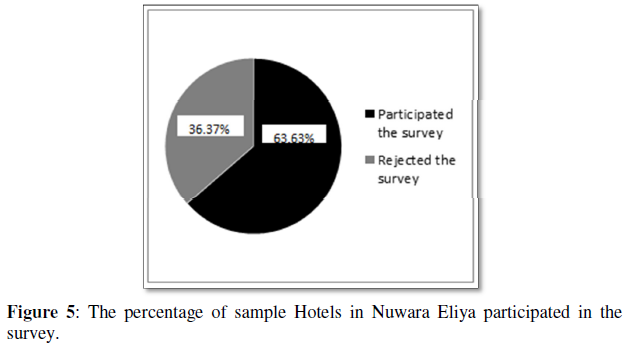
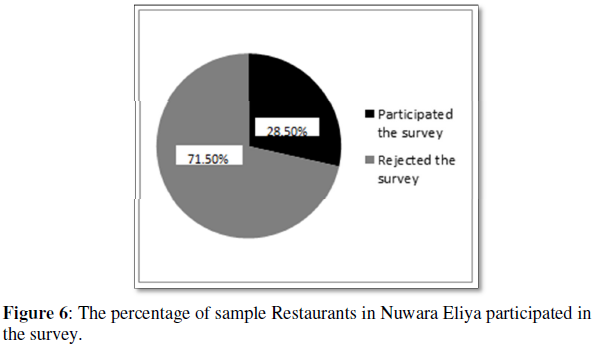


deductions, and other provincial remunerations were granted for large-scale hotels which are 5 stars, 4 stars, and 3 stars registered under SLTDA. Unfortunately, small-scale hotels and restaurants below the 3 stars category have not been granted satisfactory financial benefits from government or provincial authorities. Moreover, a few hotels and restaurants were completely shut down due to the financial difficulties of maintenance. Considering this background, it reveals that the hotels and restaurants related to the accommodation sector in Nuwara Eliya now have been bankrupted and mal-functioned due to the travel and tourism pause during the pandemic outbreak in Sri Lanka (Ariyawardana, 2021).
In conclusion, the concept of “Travel Bubble” is an applicable solution for Nuwara Eliya, Sri Lanka to launch post-COVID-19 tourism resumes. However, the issues and shortcomings related to administration, coordination, and facilitation have become an obstruction to achieve the real objectives of the concept. As well, the preparation of the accommodation sector equipped with conceptual knowledge, financial and logistic preparedness towards tourism operations are not satisfied and adequate to launch travel bubble practices in Nuwara Eliya. Further, the Government's attention and funds for these practices are yet to be motivated and promoted. The absence of an excellent corporation and coordination between the responsible authorities (SLTDA, Sri Lanka Hotel Corporation, and the Ministry of Tourism) and accommodation providers occur frequent failures of this particular concept in Nuwara Eliya. Hereby, it is important to immediately respond to the problems related to the implementation of recognized tourism guidelines and health protocols in the process of bringing success through the practice of “Travel Bubble”. Therefore, this study might be a good guidance to achieve the objectives of the concept of “Travel Bubble” succeeding “Sri Lanka Tourism Operational Guidelines with Health Protocols” dedicated for accommodation sector in future Nuwara Eliya, Sri Lanka.
RECOMMENDATIONS
This study suggested a few recommendations to bring success in “Travel Bubble” operations in Nuwara Eliya in the future. They are,
- Establishing a formal mechanism to coordinate governing authorities with middle level and ground-level stakeholders;
- Promoting South Asia tourism markets to lodge in Nuwara Eliya at low cost;
- Establishing a common medical center dedicated to tourism affairs in the city equipped with PPEs;
- Encourage hoteliers to arrange individual transport networks and customized tour itineraries for the tourists traveled with "Travel Bubble";
- Introducing “Ayurvedic Packages” to entertain medicinal beverages and foods which are supported to develop the immunity during the lodging periods in particular accommodations. Hereby, Venivelgeta, Ranawara, Kottamalli could be promoted and recommended as beverages for the guests.
- Organizing awareness programs for the hoteliers regarding the concept and launch workshops for the accommodation providers to convince the practice of the concept and recommended guidelines.
- Provide financial support and grant government and provincial benefits for accommodation providers estimating their lost while introducing loan facilities to be recovered;
- Establishing Rapid Response Teams in the selected destinations to deal with emergency COVID-19 cases reported during tour operations with “Travel Bubble”.
ACKNOWLEDGMENTS
This research would not be possible without the exceptional support of Mr. Mahinda Kumara, The Chairperson, Alpine Hotel, Nuwara Eliya, and the staff. His knowledge and countless support were admired during the field visit to obtain data and information. I am indebted to Mr. Nishan Deshapriya Adhikari, The Excise Officer, The Excise Department; Nuwara Eliya extending his helping hand to facilitate accommodations for several days to accomplish the field survey in Nuwara Eliya. Further, I am grateful to all the hotels and restaurants that supported providing valuable information and sharing experiences. Finally, my heart-touching gratitude goes to my bellowed parents, kids, and soul-mate for their patient and dedication throughout this task.
- Anthony, V. (2020). Spotlight on travel bubbles and reviving tourism. available online at: http://www.themorning.lk/spotlight-on-travel-bubbles-and-reviving-tourism/.
- Ariyawardana, S.S.N. (2021). The potentials of Travel Bubble to re-establish the industry of travel and tourism A study on the contribution of the hotels and restaurants in Nuwara Eliya Sri Lanka. International Tourism and Hospitality Journal 4(2),1-14.
- Carrier, J.G., & Macleod, D.V.L. (2005). Bursting the bubble, The sociocultural context of ecotourism. Journal of the Royal Anthropological Institute 11, 315-334.
- Cohen, E. (1972). Towards a sociology of international tourism. Social Research, 39 (1), 164-182.
- Dickens, B. L., Koo, J. R., Lim, J. T., Sun, H., & Hannah, E.(2020). Strategies at points of entry to reduce importation risk of COVID-19 cases and re-open travel. Journal of travel medicine 27(8). Available online at: https://academic.oup.com/jtm/article/27/8/taaa141/5897021
- Hamza, M., & Kotelawala, H. (2021). Sri Lanka tourism regulator not provided Ukrainian travel itinerary Sigiriya Pnaruwa trips cancelled. Available online at https://economynext.com/sri-lanka-tourism-regulator-not-provided-ukrainian-travel-itinerary-sigiriya-pnaruwa-trips-cancelled-77516/#.
- Helble, M., & Fink, A. (2020). Reviving Tourism amid the COVID-19 Pandemic1 Asian Development Bank. http://hdl.handle.net/11540/12487. License CC BY 3.0 IGO. Available online at: https://think-asia.org/bitstream/handle/11540/12487/reviving-tourism-amid-covid-19-pandemic.pdf?sequence=1
- Jacobsen, J.K.S. (2003). The tourist bubble and the Europeanization of holiday travel. Tourism and Cultural Change 1(1), 71-87. Available online at: https://www.researchgate.net/publication/237723874_The_Tourist_Bubble_and_the_Europeanisation_of_Holiday_Travel
- Khan, S., Tiwari, R., Natesan, S., Yatoo, M.I., Malik, Y.S., et.al, (2020). International travel during the COVID-19 pandemic Implications and risks associated with Travel Bubbles Journal of Travel Medicine 1-3. Indian Veterinary Research Institute. Available online at: https://www.researchgate.net/publication/344412067_International_travel_during_the_COVID-19_pandemic_Implications_and_risks_associated_with_'Travel_Bubbles
- SLTDA (2019). Sri Lanka Tourism Development Authority. Annual Statistical Report Research and International Relations Division SLTDA 14. Available online at: https://srilanka.travel/SLTDA_documents/ASR%202019.pdf
- SLTDA (2019). Sri Lanka Tourism Development Authority. Tourism Industry Report Available online at: www.sltda.gov.lk/statistics
- SLTDA (2020). Sri Lanka Tourism Development Authority. Sri Lanka Tourism Operational Guidelines with Health Protocols Available online at: https://www.srilanka.travel/pdf/SL_Tourism_Operational_Guidelines.pdf
- Smith, V.L. (1977). Introduction. In VL Smith Hosts and Guests. The Anthropology of Tourism 1-14. Philadelphia University of Philadelphia Press.
- UNWTO (2021). United Nations World Tourism Organization. UNWTO World Tourism Barometer and Statistical Annex. UNWTO World Tourism Barometer 19(2). Available online at: https://www.e-unwto.org/doi/epdf/10.18111/wtobarometereng.2021.19.1.2
- UNWTO (2020). United Nations World Tourism Organization. UNWTO World Tourism Barometer18(5),1728-924 UNWTO Madrid Spain First printing. Available online at: https://www.e-unwto.org/doi/pdf/10.18111/wtobarometereng.2020.18.1.5.
- Velrajh, V. (2021). Sri LankaVisit to Sigiriya and Polonnaruwa by Ukrainian tourists cancelled. Available online at: https://menafn.com/1101379202/Sri-Lanka-Visit-to-Sigiriya-and-Polonnaruwa-by-Ukrainian-tourists-cancelled&source=30
- Weaver, A. (2005). Spaces of containment and revenue capture Super-sized cruise ships as mobile tourism enclaves. Tourism Geographies 7(2), 165-184.







